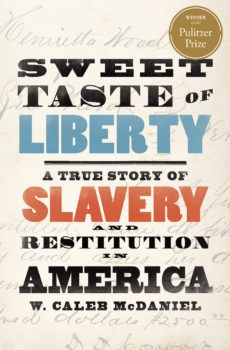Former Student Wins 2020 Pulitzer Prize in History

Texas A&M University former student Caleb McDaniel ‘00, ‘01 (M.A.) is the winner of the 2020 Pulitzer Prize in History for his book Sweet Taste of Liberty: A True Story of Slavery and Restitution in America.
The story McDaniel shares in Sweet Taste of Liberty follows the life of Henrietta Wood, who was born into slavery. Wood was taken to Cincinnati in 1848 and legally freed before being abducted and sold back into slavery in 1853. She remained enslaved in Robertson County near Hearne, Texas, throughout the Civil War, regained her freedom and returned to Cincinnati in 1869. In 1870 she sued the man who abducted her and sold her back into slavery. A federal jury awarded her $2,500, which was the largest known amount ever awarded by an American court in restitution for slavery.
As a student at Texas A&M, McDaniel was a recipient of the President’s Endowed Scholarship. He received his bachelor’s degree in history in 2000, and a master’s in philosophy in 2001.
“When a professor like Caleb McDaniel writes a Pulitzer Prize-winning book like Sweet Taste of Liberty, he’s not just answering questions about the African-American past in U.S. history,” said Carlos Kevin Blanton, department head of history at Texas A&M. “He’s also getting at very real issues that we have today when we talk about reparations, what we owe to the past, and the legacy of slavery. Slavery doesn’t just end. It’s legacy lives on through policies and practices. We’re still arguing over the same issues.”
Blanton said historians don’t just examine the past because they enjoy learning about what happened long ago. Instead, they look to the past to find answers about issues we’re grappling with in the present. This is true of McDaniel’s research that ultimately led him to write his latest book, though how he landed on Wood’s story is a tale of its own.
“In 2014, I was doing research about enslaved people who were forcibly brought to Texas during the Civil War,” McDaniel said. “A friend and colleague sent me a newspaper article from the 1870s that featured Wood’s story. When I started learning more about her story and how she had eventually returned to Cincinnati and filed a lawsuit for restitution, it caught my interest and it quickly became clear that it deserved a book all on its own.”

“There are still a lot of myths and misinformation surrounding the mystery of slavery and the Civil War even today. It’s important for historians to go back to the primary sources and documents and reconstruct the truth as best we can,” McDaniel said. “We especially need to find ways to talk about the experiences of enslaved people like Wood. The archives that we have don’t always make it easy to find stories like hers, but it’s really an important part of American history to capture the experiences of women, and Black women in particular in the 19th century.”
Piecing together the truth about the past is no small task—when McDaniel began researching Wood’s story, he quickly realized uncovering her past would necessitate a great deal of travel.
“It required a lot of ‘detective’ work to piece together her story, including looking at archived documents scattered across different states,” McDaniel said. “There were gaps in her story that couldn’t quite be filled otherwise. It was also challenging to write about this story in a way that recognized her achievement, but not in a way that downplayed the horrors that she endured or the problem that continues for African Americans even after emancipation and after her legal victory.”
McDaniel gives credit to the education he received at the College of Liberal Arts, adding that his mentors in the college set him on his path toward his doctoral degree. He said he still thinks about classes he took and advice he received from faculty members like David Vaught, Al Broussard, April Hatfield, Steve Daniel and Craig Kallendorf when he teaches students today at Rice University, where he is an associate professor of history.
James Rosenheim, emeritus professor of history and former director of the Glasscock Center for Humanities Research, recalls judging an undergraduate essay contest that McDaniel entered in his senior year.
“After 20 years, I still remember being impressed by Dr. McDaniel’s paper,” Rosenheim said. “It seemed perfectly capable of having come from the pen of a graduate student. It was far beyond what I had ever encountered from my undergraduates taking an advanced level course and doing primary research.”
McDaniel said the real prize is knowing that Wood’s story is finally getting the recognition it deserves.
“To me, the greatest outcome of receiving the Pulitzer Prize is that more people will likely learn about Henrietta Wood’s story,” McDaniel said. “It’s an honor to her and a credit to her resilience and determination to tell her own story. I’m very happy that the Pulitzer Board recognized a story like hers as a significant chapter of American history.”
Read more on the College of Liberal Arts website.
This article by Rachel McKnight originally appeared on the College of Liberal Arts website.





